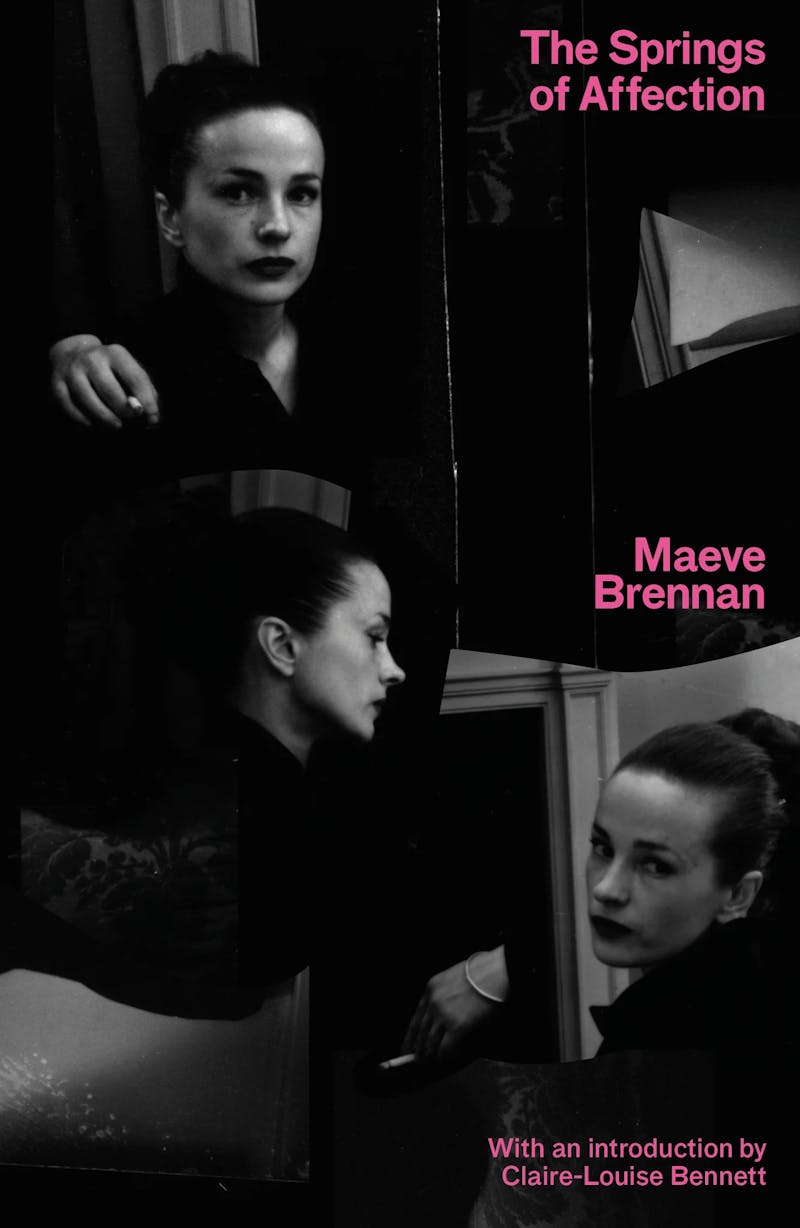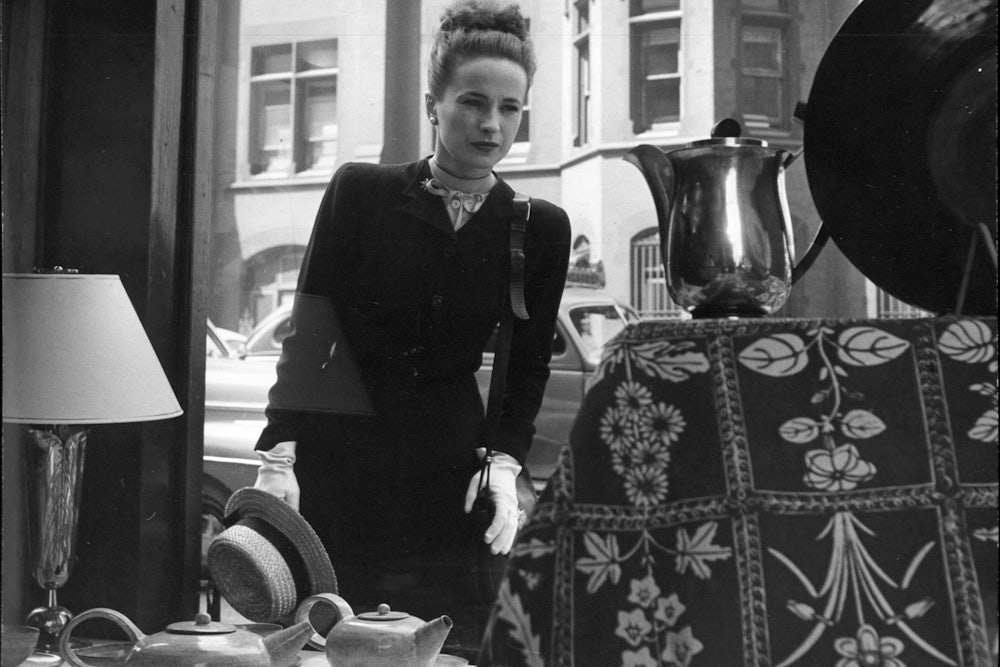“I never want to leave this house,” says Rose Derdon—one of the unhappily married women who populate Maeve Brennan’s stories—shortly after moving in. The house is 48 Cherryfield Avenue, Ranelagh, in Dublin, one of several “four-room stone houses that jutted out at the back to give space for a kitchen, and above the kitchen a small extra room with a bathroom next to it,” with three steps down to the kitchen and a yellow laburnum tree in the yard. What Brennan knows, and Rose doesn’t, is that her wish will come to seem like a curse.
The marriage stories in her collection The Springs of Affection are perhaps Brennan’s best-known work. Forty-eight Cherryfield Avenue, her childhood home, was a frequent setting for stories about couples whose newlywed sense of optimism turns “opaque and blank like fear and reflected nothing.” Brennan describes interiors and interior lives in detail; they are stories primarily about women and their worlds, which, in these stories, hardly extend beyond their garden walls. The marriages are entirely unsuitable, always made up of two people unable to understand how to share space or how to share their hopes and fears and feelings; domesticity is more claustrophobic than cozy.

This focus has led some critics to understand her as a writer who conspicuously avoided politics; one who, in Kate Bolick’s words, “was preoccupied with a different sort of brutality: the emotional policing, waterboarding and extortion that can take place within even the most well-intended and pious marriage.” But Brennan was acutely aware that the domestic and the political were intertwined; her early experience of home life was shaped by the union of marriage and revolution. At 48 Cherryfield Avenue, she was raised by suburbanites who had met as revolutionaries.
Bob and Una Brennan were members of the secret, oath-bound Irish Republican Brotherhood, her mother one of only two known female members ever admitted. When Maeve was born, in January 1917, her father was in prison and sentenced to death for his role in the Easter Rising. He was freed in 1917 when a general amnesty was announced, and by 1919, he was in hiding. Twice the family home was raided by soldiers of the Provisional Government, looking for him.
Brennan wrote about the experience directly in the autobiographical sketches in The Springs of Affection—recalling how the soldiers “crowded into our narrow little hall and tramped around the house, upstairs and downstairs, looking everywhere and asking questions.” But Brennan’s feel for revolutionary politics also manifests subtly in the domestic short stories in the book, though they don’t address Irish politics directly. Both revolution and marriage are, after all, exercises of hope; you might even call them both attempts at homemaking—efforts to construct something new, stable, and supportive. Her stories of people who cannot be happy together are about the uncomfortable friction between grand plans for the future and the relentless dailiness of living—a lesson learned by thwarted revolutionaries and unhappy spouses alike.
Brennan’s affectionate and charming stories about her childhood can’t avoid the Irish politics so central to her early life. In a story about her father’s time on the run, the political is filtered through the domestic: After the first raid of their home, young Maeve asks her mother if she would like a cup of tea, and “she said yes, she would like a cup. I filled the kettle, splashing water all over the floor, but she wouldn’t trust me to light the gas, and in the end she had to make the tea herself.” These stories are, in a word, homey.
But there’s also an echo of Brennan’s family history in her stories of Rose Derdon and Delia Bagot—who both share their address, eyes, and love of flowers with Brennan’s mother. Una Brennan was not only a revolutionary but a feminist, a member of the Irish feminist organization Inghinidhe na h-Éireann and, later, of the Cumann na mBan, the women’s auxiliary to the Irish Volunteers. Yet Irish independence did not bring women’s liberation. In 1932, married women were banned from teaching; in 1935, contraception was outlawed; in 1936, the minister for employment was given the power to limit the number of women in any industry; and in 1937, the de Valera government enacted the new Constitution, which declared that “the State recognises that by her life within the home, woman gives to the State a support without which the common good cannot be achieved.” This was oppression enacted by the very men they had fought alongside.
Rose and Delia each experience a sense of being trapped by domesticity. Both begin with hopes for a happy life, a beautiful home; instead, they find their lives made small. Rose spends her days alone, in the kitchen or the garden, her husband at work and her son “vanished forever into the commonest crevasse in Irish family life—the priesthood.” Her husband has “come to distrust her presence everywhere except in the house,” and even there he seems to simply tolerate her as an inevitability, like the furniture. In “An Attack of Hunger,” Rose thinks, “There was no hope for her inside the house. Her entire life was in the house.”
Rose and her husband, Hubert, loved each other once. In “A Young Girl Can Spoil Her Chances,” a story recounting the early days of their courtship, Brennan writes that “if Hubert had been told at that moment that Helen of Troy had come back to earth and was called Rose he would not have denied it.… Hubert thought of Rose and the future, and his thought was all of innocence and of the necessity of earning enough to enable them to hold their heads up and never have to give thanks to anybody for anything as long as they lived.” But the life they hoped for is dramatically at odds with the one they end up with.
In “Family Walls,” the Derdons’ evening is completely derailed when Hubert sees Rose closing the door to the kitchen just as he comes home; he is sure she saw him, sure this was a slight. He knows that this is “partly the fault of the house, which was much too small. Any house would have been too small, but this one was much too small. There wasn’t a corner in it where you could hide without causing questions—those silent questions that were not questions at all but reproaches.” As he stews in his anger, he recalls a time before they moved in, when, to end their first fight as a married couple, he suggested to Rose that they “go out for a little walk and talk about the nice house we’re going to have all to ourselves one of these days,” and when they found 48 Cherryfield Avenue, Rose told him, “I’ll never get tired of this house.” But as he sits by the fire, he thinks, “Poor Rose, he didn’t blame her, but by her presence in his life she showed what he had tried to do and that he had hoped, and by her behavior she showed what his hopes had come to. He was ashamed of her. Without her, who knows what he might have done.”
For Delia Bagot, the house itself becomes an obstacle to happiness. Her husband no longer shares the big front bedroom with her; because of his late hours at work, he has started sleeping in the small room above the kitchen. In “The Twelfth Wedding Anniversary,” she blames the house for keeping them apart—just as Hubert blames it for keeping him and Rose too close—reflecting that “if the little room had never existed, he would never have had the idea of shutting himself away from her. What an alarming truth it was that if they had had a smaller house they might have been happier. And yet, the house was quite small.” Martin, at work on the same day, is delaying going home. “He would have liked to put off coming home indefinitely. He would have liked to have a rest from himself. When he was in the house he was hateful to himself.” He has come to hate their small house, “because he felt the house transformed him. When he was away from home he was all right, and able to convince himself that Delia was all right.”
Unsure how to fix things, Delia cuts flowers for him and puts them in his room. The flowers are a gesture of love and care, but even Delia recognizes that “she had substituted a prayer for a decision, and that the prayer was not even for certainty but only for an extension of hope.” It is a gesture that seems certain to fail, and, indeed, when Martin comes home and sees the flowers, he is perturbed. “It was her care for him that was driving him to despair—the ceaseless care that he understood, and could not return, and did not want, and could not avoid.” He breaks, without really meaning to, Delia’s crystal bowl.
The house represents, over and over, the failure of things to be what felt promised. These are stories of people who—like Brennan’s parents—had once hoped for something and not quite managed to build it; people who let themselves and those who shared their hopes down. They are stories about the many ways a house might fail to feel like home.
As dreams of building a home fail, a sense of hope can curdle into a feeling of homelessness. And this certainly seems to have been true for Brennan herself. She moved to Washington, D.C., when her father became a diplomat in the 1930s and never moved back to Ireland for good. From Washington, D.C., she moved to New York City, where she worked first at Harper’s Bazaar and then at The New Yorker. She spent much of her life unsettled, moving from hotel to apartment to hotel, sometimes renting two apartments at once when she found a second place she preferred after the ink on the first lease had already dried. She once had parquet floors installed at an apartment, only to decide she preferred the Algonquin. She experienced periods of homelessness and lived, for a time, in the offices of The New Yorker, sleeping in a cubicle near the women’s bathroom. Of her brief marriage to fellow writer St Clair McKelway, her friend and editor William Maxwell wrote that “it may not have been the worst of all possible marriages, but it was not something you could be hopeful about.”
Though she repudiated the fight for Irish freedom—she called it “licking old wounds”—she also never quite gave up her parents’ ideals. On a trip to London, she was “outraged” when, while looking for a map, someone “offered me one with LONDON Bastion of Liberty on it,” and she refused to read the Anglo-Irish novelist Elizabeth Bowen, despite Maxwell’s urging. And she never quite stopped searching for home. While on a visit to Dublin once, she wrote to Howard Moss, the poetry editor of The New Yorker, “Dublin is a spectacle to me now, not home, not anything. No place is home—it is as it should be.”
The rare place she consistently returned to was the childhood home in her fiction. William Maxwell, in his introduction to the original publication of The Springs of Affection, called 48 Cherryfield Avenue “her imagination’s home.” It was the only one she had.






